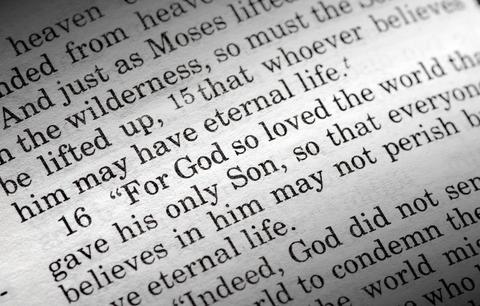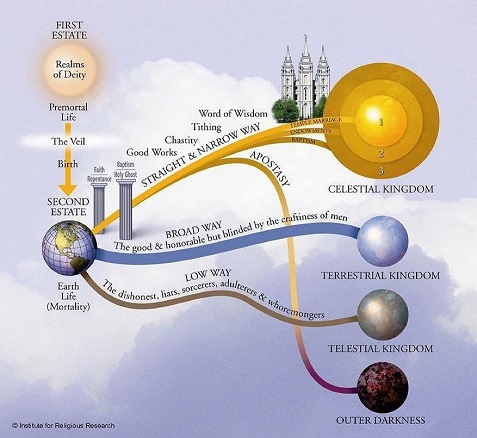
In the third and last in this series we look at the most important reason Mormonism doesn’t work; Mormonism doesn’t save sinners. John’s gospel, his good news declares, ‘For God so loved the world, that he gave his only Son, that whoever believes in him should not perish but have eternal life.’ John 3:16 is by far the most familiar, popular verse in the Bible. It is so familiar as to be considered axiomatic by most Christians, needing little or no explanation, taken as a given.
It has been described as ‘the gospel in a nutshell.’ This nutshell, however, contains more than is immediately apparent. As Christians we know this (or should) but we all too often expect the simple fact of the verse to do all the work of witnessing.
We should be prepared to help Mormons see the great good news we see in this verse, to unpack in light of further Scripture, because the LDS people don’t understand it and Mormonism doesn’t save sinners. We will look at it clause by clause.
God so Loved the World – The love of the Mormon God is a peculiar love. Mormonism teaches that all people are literally sons and daughters of God, the issue of a premortal relationship between God and a Heavenly Mother. In order to become gods themselves, these children are made to jump through the hoops of mortality where they know failing the arduous tests of this world would mean they would never set eyes on their father again. Who would do that to their child?
If I am, as Mormons teach, a natural child of God with all that means I am, surely, already a god. Tigers beget tigers, men beget men, gods beget gods. It’s like saying to a tiger cub,’If you win your stripes you will, one day, be a tiger.’ Of course, the god of Mormonism is not a god but an exalted man; think Augustus Caesar.
He is nothing like the eternal, unchangeable God of the Bible. As a man (and I suspect an American) his focus is on ambition and this attitude is reflected in the complicated plan he has his ‘children’ follow. It seems the children of this god don’t need saving so much as ‘hot-housing.’ This is why Mormonism doesn’t save sinners. This in order to prove themselves ‘worthy’ to be in his presence. Again, who would do that to their child?
The God of the Bible is eternally God, besides whom there is no god, and he says as much (Isaiah 44:6-8). Man is a creature, which is clear from the very beginning (Genesis 1:27-28). The remarkable thing for a Christian is that God takes the initiative in saving a creature, the clay who said to the potter, ‘why have you made me?’ (Isaiah 45:9)
God took the initiative in calling Abram out of his father’s pagan idol workshop in Ur of the Chaldees to establish a line and dynasty through whom God’s promises of redemption (Gen.3:15) would be fulfilled. God took the initiative in bringing the Israelites out of the house of slavery to himself and making them the people of the covenant.
God took the initiative when he came into the world in his Son to suffer for the sins of the world, making those who turn in repentance a people who were not a people (1 Peter 2:10). Salvation is God’s work.
He Gave His Only Son – The Mormons understand God to have sent his Son as an agent of heaven, rather as he might send an angel, to suffer and die for the sins of the world. Who would do that to his natural son? Joseph Smith claimed to have seen God the Father and Jesus the Son as distinct and separate beings. The Jesus of Joseph’s world is fulfilling a mission of redemption on behalf of the Father.
Almost the entire Christian world affirms the long established doctrine of the Trinity, the idea that each member of the godhead is fully and by nature God, but there being only one God. The atoning sacrifice of Christ is a clear example of this doctrine. Paul writes, ‘that God was in Christ, reconciling the world to himself…’ (1 Cor.5:19)
Strong’s Greek dictionary describes the word ‘in’ as ‘A primary preposition denoting (fixed) position (in place, time or state), and (by implication) instrumentality…’ God was not watching at a distance as his Son died for the sins of the world, but was ‘in Christ,’ instrumental in bearing the shame of the cross, in taking the weight of sin, in atoning for the sins of the world. God himself stepped down out of eternity and became a man who would bear our sins on the cross. John makes this clear in his gospel:
‘In the beginning was the Word, and the Word was with God, and the Word was God.‘ (John 1:1)
‘That Whoever Believes in Him’ – Here is the condition on which the reward of life is predicated. Mormonism understands the Atonement as designed to reverse the twin effects of the Fall. It conquers physical death so everyone is unconditionally resurrected. This the Mormons call salvation, but it is not salvation as the Bible understands it. Mormonism doesn’t save sinners.
It also makes available to those who would carefully and scrupulously follow a plan of works, the plan of salvation, would eventually be exalted and brought into the presence of God. This Mormons call exaltation. Mormons can confidently say they are ‘saved,’ because they are ‘saved’ from temporal death. Everyone is ‘saved,’ not everyone is saved as Christians understand saved. Mormon prophet John Taylor said:
‘Transgression of the law brought death upon all the posterity of Adam, the restoration through the atonement restored all the human family to life…so that all men…may be placed upon the same footing, and that all men may have the same privilege…of accepting the conditions of the great plan of redemption provided by the Father.’ (Meditation and Atonement, pp 178,181)
To the Christian believer salvation is salvation to the uttermost. Nothing better demonstrates this than the words of Jesus himself. ‘Truly, truly, I say to you, whoever hears my word and believes him who sent me has eternal life. He does not come into judgement, but has passed from death to life.’ (John 5:24)
Hearing, believing, gain for us eternal life as a present possession; ‘has eternal life.’
Having eternal life as a present possession means we need not fear condemnation, future assurance; ‘He does not come into judgement.’
Having eternal life as a present possession means we have passed into life, a past action; ‘has passed from death to life.’
All this chimes clearly with John 3:16.
Mormons struggle to understand the Christians’ insistence that we are saved by grace, not by works (Ephesians 2:8-9) even though the Bible tells us so. Indeed, even to the point of insisting the Bible contradicts itself. Comparing the words of Paul in Ephesians ‘saved by grace through faith,’ with James, ‘faith without works is dead,’ (James 220) they see two church leaders disagreeing.
Paul however, though his is a message of grace, urges us to works, ‘for we are his workmanship, created in Christ Jesus for good works, which God prepared beforehand, that we should walk in them.’ (Ephesians 2:10) Oh, the benefits of reading on a little. In writing to Corinth Paul writes of believers,‘abounding in good works.’ (2 Cor.9:8)
James, on the other hand, highlights the peril of depending on works, ‘whoever keeps the whole law but fails in one point has become accountable for all of it.’ (James 2:10) Oh, the benefit of reading the whole passage. What anguish might be avoided.
The answer, of course, is in Paul’s own words in Ephesians, ‘we are God’s workmanship, created in Christ Jesus for good works…’ Something happens to those who hear and believe, something that thoroughly equips them for good works. Paul writes, ‘if anyone is in Christ, he is a new creation. The old has passed away, behold, the new has come.’ (2 Cor.5:17)
It is the new creation, the one who has been born again in Christ, that works. Remember the words of Jesus, ‘Truly, truly, I say to you, whoever hears my word and believes him who sent me has eternal life. He does not come into judgement, but has passed from death to life.’ (John 5:24) Read more about LDS thinking on faith and works in Living by Faith.
In a late night conversation with a man named Nicodemus, Jesus explained, ‘Truly, truly, I say to you, unless one is born again he cannot see the kingdom of God.’ (John 3:3) How does the Mormon Church understand this text? On the official LDS website we find that to be born again is, ‘To have the Spirit of the Lord cause a mighty change in a person’s heart so that he has no more desire to do evil, but rather desires to seek the things of God.‘
It looks biblical, and there is much about it that is. Yet there is nothing here about new life. In fact, it reads rather like the process of repentance. A change in a person’s heart, a desire to reject evil and seek the things of God. But we shouldn’t confuse the process, a turning around, a turning away from sin, putting our trust in Jesus, with the end, a new creation in Jesus.
Mormons kn ow nothing of this, nothing of the assurance of Jesus in John 5:24. Mormonism doesn’t save sinners. A Mormon has not crossed over from death to life, simply turned a new page and started again with a renewed resolve. This brings us to the next clause, whoever believes in him
‘Should not perish but have eternal life’ – The Mormon plan of salvation sees the LDS people strive to climb, degree by degree, to ever higher heights of of privileged access, much as a mason might progress through a series of ceremonies to the higher levels of the craft.
From baptism through the temple endowment, to the highest and most secret initiations of the Mormon Church, the Mormon is kept faithful, not through love, as Paul writes (2 Cor.5:14) but because to fail at one point may see him fail to reach the highest degrees of heaven.
The text we are considering, however, explains in the simplest terms; our choice is between perishing or gaining eternal life. When Moses spoke to Israel before they entered the land he said, ‘See, I have set before you today life and good, death and evil.’ (Deut.30:15) The same is true for people today, a choice between good and evil, between life and death.
Jesus said, ‘I am the way, the truth, and the life. No one comes to the Father except through me.’ (John 14:6) John, at the beginning of his gospel, shares this amazing promise, ‘To all who did receive him, who believed in his name, he gave the right to become children of God, who were born, not of blood nor of the will of the flesh nor of the will of man, but of God.’ (John 1:12-13)
Conclusion

Mormonism doesn’t save sinners, though the Bible clearly says we must be saved. Christ saves sinners, because of his grace and mercy. Mormons strive to win as high a degree of heaven as they can achieve, following the Plan of Salvation. Christians have been won by heaven and strive to live as heaven’s citizens today to the glory of God, doing good works to glorify him, walking in the new life he has given.
Previously we have seen Mormonism doesn’t work because Mormon prophets contradict each other, and because Mormonism contradicts the Bible.

